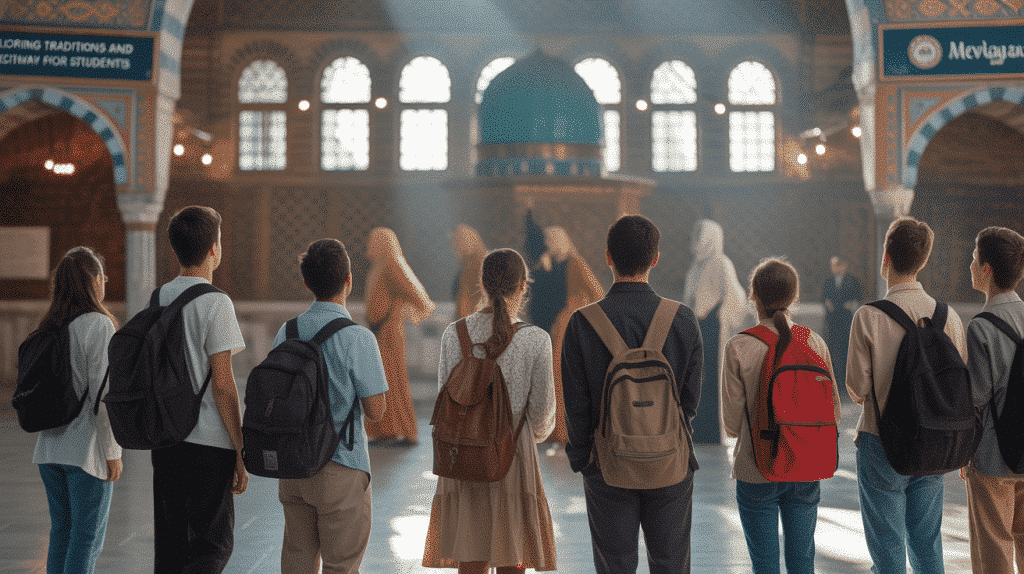Exploring Local Traditions and Customs in Konya: A Unique Experience for International Students
Konya’s Spiritual Heritage: Whirling Dervishes and Sufism
One of Konya’s most iconic traditions is the Whirling Dervishes ceremony, known as the “Sema.” This ritual is not just a dance but a spiritual act rooted in Sufism, a mystical branch of Islam. The Mevlevi Order, founded by the 13th-century poet and philosopher Jalal al-Din Rumi, has made Konya the global center for these ceremonies.
The Sema Ceremony
The Sema features dervishes dressed in white robes, symbolizing purity, who spin in harmony to achieve spiritual elevation. Visitors can attend these mesmerizing ceremonies at the Konya Cultural Centre, especially during the annual Mevlâna Festival, which draws large crowds each December to commemorate Rumi’s “wedding night,” marking his union with the divine.
Key highlights of the Sema ceremony:
- Spiritual significance: Aimed at achieving a deeper connection to the divine.
- Cultural representation: A unique blend of dance, music, and philosophy.
- Visitor engagement: Opportunities to participate in cultural festivals, adding depth to the international student experience.
For international students at institutions like Aydin University or Medipol University, exploring these spiritual traditions can enhance their understanding of Turkish culture, making their study experience much more enriching.
Local Cuisine: The Heart of Community Life
Konya’s culinary traditions are an essential part of its local customs, reflecting both the city’s agricultural riches and its communal lifestyle. The preparation and sharing of specific dishes illustrate the importance of hospitality and community in Konya.
Notable Dishes
- Etli Ekmek: A flat, elongated bread topped with seasoned minced meat, vegetables, and spices, often enjoyed in communal settings.
- Fırın Kebabı: Slow-cooked lamb, famed for its tenderness and flavor.
- Okra Soup (Bamya Çorbası): A traditional starter, especially popular during festive occasions.
- Tirit: A comforting dish made from lamb, rice, and bread, often served at gatherings and celebrations.
- Angel’s Hair Dessert (Tel Kadayıf): A sweet treat prepared especially during holidays and family events.
These dishes are not just about nourishment; they are a focal point for gatherings, especially during holidays, such as Ramadan. Understanding local traditions, especially through food, can significantly enhance the educational experience for international students at institutions like Uskudar University and Istanbul Bilgi University.
Festivals, Celebrations, and Everyday Customs
Major Festivals
- The Mevlâna Festival: Held every December, this festival spans ten days leading up to Rumi’s memorial and attracts over a million visitors. The festival features Sema ceremonies, poetry readings, and traditional music, offering an immersive experience into Konya’s spiritual and cultural atmosphere.
- Community Gatherings: Meals are often communal, especially during Ramadan when families and neighbors gather to break the fast. Weddings and religious holidays are major events marked by feasting and the exchange of gifts and local foods.
Daily Customs
The behavior and attire of the residents reflect their conservative values, and visitors are encouraged to respect local customs by dressing modestly, particularly in religious and cultural sites. Engaging in these local traditions can give international students a more holistic understanding of Turkish culture and values.
Handicrafts and Folk Art
Konya is also known for its handicrafts, including woven rugs, point lace, and embroidered textiles, showcasing the city’s rich artistic heritage. These crafts are often seen at local markets and during cultural festivals, offering insight into traditional skills passed down through generations.
Importance of Handicrafts
- Cultural Heritage: Handicrafts represent the city’s artistic tradition and creativity, highlighting the skills of local artisans.
- Souvenir Opportunities: Students and visitors can purchase unique items to remember their time in Konya.
- Educational Insights: Learning about these crafts can provide a deeper understanding of the region’s cultural identity, enriching the overall study experience.
Summary
Konya’s local traditions and customs are deeply intertwined with its religious history, culinary richness, and community-oriented lifestyle. From the spiritual whirl of the dervishes to the flavors of its unique dishes and the warmth of its communal celebrations, Konya offers international students a profound and authentic experience of Turkish culture.
International students considering studying in Türkiye can greatly benefit from immersing themselves in Konya’s vibrant traditions. Institutions such as Antalya Bilim University and Istinye University provide excellent academic programs that allow students to explore these cultural dimensions while pursuing their education.
Take the Next Step with Study in Turkiye
Are you interested in exploring the rich traditions of Konya while studying in Türkiye? Contact us today at Study in Turkiye to learn how you can embark on this exciting educational journey. Discover the opportunities we offer for international students and how we can assist you with admission processes and placement at top universities in Türkiye.

